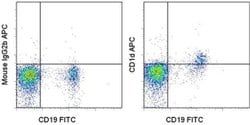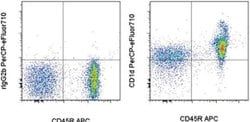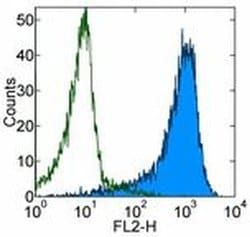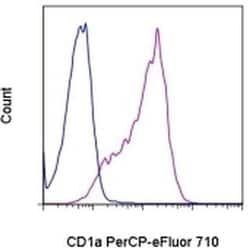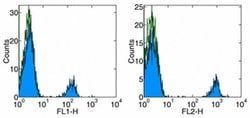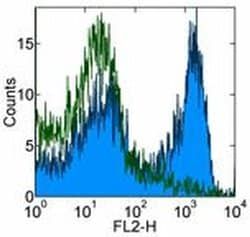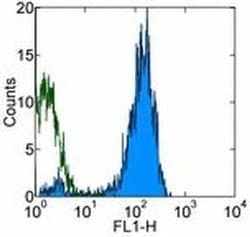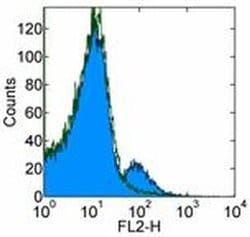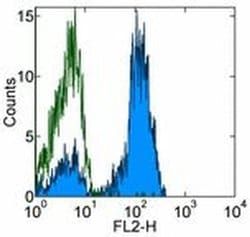CD1d Monoclonal Antibody (51.1), eBioscience™, Invitrogen™
Manufacturer: Invitrogen
Select a Size
| Pack Size | SKU | Availability | Price |
|---|---|---|---|
| Each of 1 | 50-123-27-Each-of-1 | In Stock | ₹ 12,282.00 |
50-123-27 - Each of 1
In Stock
Quantity
1
Base Price: ₹ 12,282.00
GST (18%): ₹ 2,210.76
Total Price: ₹ 14,492.76
Antigen
CD1d
Classification
Monoclonal
Concentration
0.5 mg/mL
Formulation
PBS with 0.09% sodium azide; pH 7.2
Gene Accession No.
P15813
Gene Symbols
CD1D
Purification Method
Affinity chromatography
Regulatory Status
RUO
Gene ID (Entrez)
912
Content And Storage
4° C
Form
Liquid
Applications
Flow Cytometry, Immunohistochemistry (Frozen), Immunoprecipitation
Clone
51.1
Conjugate
Unconjugated
Gene
CD1D
Gene Alias
AI747460; Antigen-presenting glycoprotein CD1d; antigen-presenting glycoprotein CD1d1; Cd1; CD1.1; CD1A; Cd1d; CD1D antigen; CD1D antigen, d polypeptide; CD1d molecule; CD1d.1; Cd1d1; CD1d1 antigen; CD1d1 molecule; differentiation antigen CD1-alpha-3; HMC class I antigen-like glycoprotein CD1D; Ly-38; R3; R3G1; T-cell surface glycoprotein CD1d; T-cell surface glycoprotein CD1d1; thymocyte antigen CD1D
Host Species
Mouse
Quantity
100 μg
Primary or Secondary
Primary
Target Species
Human
Product Type
Antibody
Isotype
IgG2b κ
Description
- Description: The monoclonal antibody 51.1 reacts with human CD1d, a member of the CD1 family with similarity to the non-polymorphic MHC Class I-like molecules
- CD1d is a highly conserved single transmembrane receptor of the Immunoglobulin Superfamily
- CD1d can associate with beta-microglobulin another feature showing similarity to MHC class I molecules, but can also exist as a nonglycosylated protein not in association with beta microglobulin
- This suggests different control mechanisms for presenting glycolipid containing molecules to CD1d reactive NKT cells
- Expression of CD1d is found on B cells of the periphery, in resting monocytes and cortical thymocytes
- On intestinal epithelial cells (IEC) expression is polarized
- Expression can also be found at low levels intracellularly in hepatocytes
- In HCV (hepatitis C virus) livers, CD1d is highly expressed compared to normal controls
- The 51.1 monoclonal antibody has been shown to have functional activity; blocking the interaction of CD1d transfected cells with NKT cells
- Applications Reported: This 51.1 antibody has been reported for use in flow cytometric analysis, immunoprecipitation, and immunohistology staining of frozen tissue sections
- Applications Tested: This 51.1 antibody has been tested by flow cytometric analysis of normal human peripheral blood cells
- This can be used at less than or equal to 0.5 μg per test
- CD1d is a heavy chain associated with Beta 2 microglobulin on cortical thymocytes
- Beta 2 microglobulin independent expression of CD1d has also been demonstrated on human intestinal epithelial cells
- CD1d is the sole group 2 member of the CD1 family of major histocompatibility (MHC) like glycoproteins
- The CD1d gene encodes a divergent member of the CD1 family of transmembrane glycoproteins, which are structurally related to the major histocompatibility complex (MHC) proteins and form heterodimers with beta-2-microglobulin
- The CD1 proteins mediate the presentation of primarily lipid and glycolipid antigens of self or microbial origin to T cells
- The human genome contains five CD1 family genes organized in a cluster on chromosome 1
- The CD1 family members are thought to differ in their cellular localization and specificity for particular lipid ligands
- The protein encoded by the CD1d gene localizes to late endosomes and lysosomes via a tyrosine-based motif in the cytoplasmic tail
- Diseases associated with CD1D include Mycobacterium Malmoense and Autoimmune Disease.
